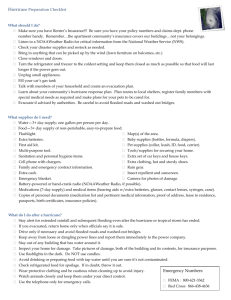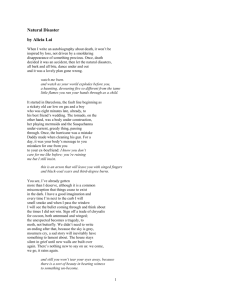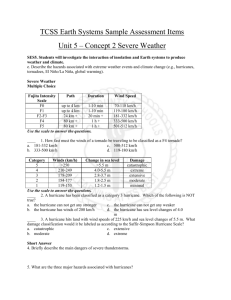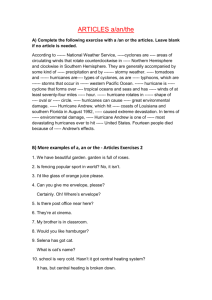Condominium Association, Inc. 610 Clematis Street, Suite 100 West
advertisement
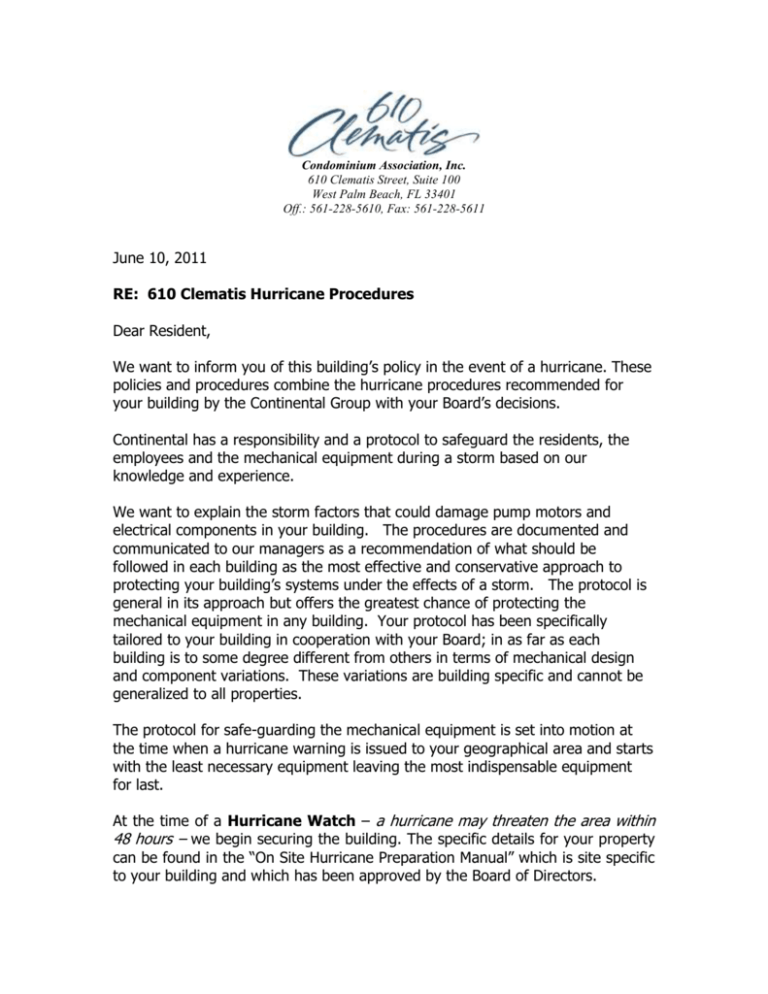
Condominium Association, Inc. 610 Clematis Street, Suite 100 West Palm Beach, FL 33401 Off.: 561-228-5610, Fax: 561-228-5611 June 10, 2011 RE: 610 Clematis Hurricane Procedures Dear Resident, We want to inform you of this building’s policy in the event of a hurricane. These policies and procedures combine the hurricane procedures recommended for your building by the Continental Group with your Board’s decisions. Continental has a responsibility and a protocol to safeguard the residents, the employees and the mechanical equipment during a storm based on our knowledge and experience. We want to explain the storm factors that could damage pump motors and electrical components in your building. The procedures are documented and communicated to our managers as a recommendation of what should be followed in each building as the most effective and conservative approach to protecting your building’s systems under the effects of a storm. The protocol is general in its approach but offers the greatest chance of protecting the mechanical equipment in any building. Your protocol has been specifically tailored to your building in cooperation with your Board; in as far as each building is to some degree different from others in terms of mechanical design and component variations. These variations are building specific and cannot be generalized to all properties. The protocol for safe-guarding the mechanical equipment is set into motion at the time when a hurricane warning is issued to your geographical area and starts with the least necessary equipment leaving the most indispensable equipment for last. At the time of a Hurricane Watch – a hurricane may threaten the area within 48 hours – we begin securing the building. The specific details for your property can be found in the “On Site Hurricane Preparation Manual” which is site specific to your building and which has been approved by the Board of Directors. When a Hurricane Warning – hurricane force winds are expected to make landfall within 36 hours – has been issued and after all preparations have been completed, non-essential personnel, under the direction of the manager, will leave at the end of their shifts. At this time, it is imperative that residents clear all items from their balcony/terrace. This is an extremely important safety precaution as items left on a balcony/terrace during heavy winds can become threatening to the property and other residents. Failure to remove items from the balcony/terrace will result in our staff entering the unit and removing items, if time permits. In doing so, the resident will incur a $200.00 fee. The essential personnel – manager, engineer, and front desk staff – will remain at your property maintaining building services and assisting residents. When sustained winds reach 45 mph and the hurricane continues to be an imminent threat, the essential personnel, in agreement with the Board of directors, will begin to shut down the properties four main mechanical systems- elevators, HVAC equipment, domestic water pumps and pool equipment. This helps to assure that your systems will not be damaged as a result of operating during the storm and will be operational after conditions return to normal and power has been restored. After the shut down has been completed, our essential personnel will leave the property. Any employee remaining at the property, at the request of the Board, after this shut down, is required to accept the terms of and sign a waiver form provided by Continental. Board signature is also required on the waiver. Essential employees will return to your property as soon as physically possible after sustained winds have dropped below 45 mph and an all clear has been issued. All other employees are required to report back to your property at daybreak and when sustained winds have dropped below 35 mph. Employees will have the option of using any available sick time to be compensated for any time missed due to a mandatory evacuation. The four main mechanical building components that affect the entire building and should be protected are the elevators, HVAC equipment, domestic water pumps, and the pool equipment. ELEVATORS: The elevators should be parked on the upper floors of the building with the doors closed. (The highest possible floor is recommended by the elevator companies). Pull disconnect switch in the machine room in the off position before power fails. Close up all vents and openings at the top of the hoist way to prevent water from getting into the elevator shaft and secure door to elevator room so that it does not fly open. WHY: In the event of a coastal surge, flooding will damage the elevators and fill the pits. In addition to flooding, water damage caused by wind driven rain most likely will enter the shaft and ruin the electrical equipment on top of the cars. This kind of damage will render a building immobile for a long period of time while the elevator company repairs the equipment. If the elevators are running and the power is interrupted, residents may be stuck inside the cabs for long periods of time. Evidence has shown, that many people suffer anxiety or heart attacks in these situations. Emergency crews may not be able to respond to 911 calls under hurricane conditions. HVAC EQUIPMENT: Turn off power to the Air handlers and A/C units for the Common area. WHY: Due to excessive wind and rain produced during a hurricane, rain water could find its way into high voltage areas within A/C units causing serious problems to A/C components. A power surge could also burn circuit boards, fuses and compressors of the Common area units. DOMESTIC WATER PUMPS Staff will turn off power to the domestic water pumps. (Buildings that are equipped with staged water pumps may consider leaving one pump on manual override if the pressure is sufficient for the upper floors.) WHY: Loss of electrical power will cause pumping stations to loose pressure. If not enough water reaches the pumps, they may burn out. POOL EQUIPMENT Staff will turn off power to the pool equipment and lower the water level in the pools and Jacuzzis. WHY: Loss of electrical power will cause pumps to loose pressure. If not enough water reaches the pumps, they may burn out. The chemical feeders will also shut down, causing chemical imbalances in the pools. Debris will be driven in the pool, clogging filters. There are other sections of the building that must be secured but do not create as much dispute as the A/C, water, and the elevators, such as garage doors which should be left in locked open position and other items in a check list that is available to all managers to follow as a guideline so that all aspects of the building are inspected prior to the impact of the hurricane. NOTE: We do NOT ever shut off electricity to the building. Sincerely, Steve Gutierrez, LCAM Community Association Manager 610 Clematis Condo Association, Inc. For the Board of Directors

